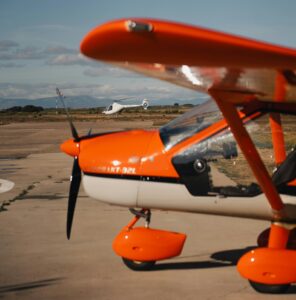Should I choose an integrated or modular pilot training course? I get asked this question a lot, and people are usually surprised, when I don’t immediately bestow the virtues of one or the other, but instead reply with that all too frustrating phrase, “It depends”.
The problem is, that there is no correct answer, but there are some features of each which target different types of trainee pilots.
What are modular & integrated pilot training courses?
Modular pilot training is when a pilot builds up their training qualifications on the back of previous qualifications or licences.
Think of it as taking small steps towards gaining a pilot’s licence, which allows you to enjoy fewer restrictions with more freedom and greater licence privileges over time. This means that you can complete the path towards your commercial pilot licence in smaller, more flexible and affordable chunks.
Integrated training, on the other hand, is where a student pilot will attend a full-time course. An integrated training course will generally take in low or no experienced trainees and gives them all the training needed to end up in a commercial pilot role.
Which option is right for me?
When deciding whether to choose an integrated or modular pilot training course, ask yourself the following;
The three main questions:
- How much time do I have available to achieve this goal?
- Do I have any existing experience?
- What are my financing options?
Let’s take each one in turn
How much time do I have available to achieve this goal?
Getting your pilot’s licence is a rewarding but demanding proposition.
The role requires you to understand a wide variety of subject areas to a reasonably detailed level, whilst not going so deep that you fail to see the big picture. (This is why the SkyLearner system is not just a question bank, but instead uses interactive learning material, key facts and practice tests to help create genuine understanding).
This means a lot of study, practice and ultimately time. Not everyone will have the same levels of time available.
Some students, will be in full-time employment, have family commitments alongside other busy life events, and therefore need to fit their pilot training alongside these other important and often unavoidable demands.
Others can dedicate a huge amount of time, freeing up their schedule, and embracing the training in a full-time capacity.
It may be tempting to attach age brackets here, but don’t be fooled!
Both older and younger students pursue full-time flight training. Some have established careers, while others are fresh out of school, approaching it with the commitment of a university course.
However, my personal advice is that if you have less time available and need more flexibility around your study, then the modular pilot training route is probably better suited to your needs.


If on the other hand, you can free up as much time as you need, then you can choose either modular or integrated pilot training, as to which one you should go for, well keep reading!
Do I have any existing experience?
Do you have a private pilot licence (PPL) already, or maybe you have never flown an aircraft at all?
While modular and integrated pilot training routes can accommodate both scenarios, there are definitely some points students should consider.
A modular pilot training course, is specifically designed to allow a student pilot to build on previous experience, taking into account their previous licences or experience and allowing further development towards that higher licence.
It is designed for pilots to be able to pick and choose different courses from different flight schools. This makes modular training particularly attractive, if you have any previous experience beyond a simple trial flight, while also still very much catering for those with no experience.
Integrated pilot training, is primarily aimed at those who have little to no flying experience. This does not prohibit existing licence holders, but it is certainly less cost-efficient for those student pilots with existing experience.
The integrated pilot course must be completed in full, meaning that you are paying to repeat even the most basic steps of flight training, even those which you have already completed before joining.
This means that those with existing experience generally prefer modular, with students having little or no previous experience being able to choose either.
What is my financing plan?
Let’s face it, you say the word pilot training, and you see your bank account drain.
Sound familiar? Well you’re not alone, I was there once, and you have a lot of company.
Pilot training financing is a Q & A article all on its own, but let’s just address the points with reference to the question at hand, “should I choose an integrated or modular pilot training course”?
Generally, modular pilot training is cheaper. How much cheaper? It really depends on the school, but the differences can be eye watering.
So for those trying to keep control of those purse strings, modular pilot training is more likely to allow you the flexibility to implement some cost savings. This may be as simple as finding cheaper accommodation or having a lower flying per hour cost.
However, I will add a caveat here. Poorly informed or misinformed modular students can spend a huge sum of money unnecessarily, simply by not understanding the CAA licensing laws and seeing areas where requirements can be merged.
You wouldn’t buy a house without a consult, so why start your training without getting your information right and structuring a plan? This is a huge investment!!!
I strongly advise that you reach out to someone, or somewhere you trust, who has recent knowledge regarding the different pilot training requirements and legislation, BEFORE you commit to continuing beyond LAPL or PPL.
At SkyLearner we offer this advice online and free of charge, to all of our students, and many are often surprised to realise that they have misunderstood a requirement somewhere and over or underestimated the costs. If you want help putting together your modular training plan, contact us.
Personal recommendation
At SkyLearner we understand why people choose modular or integrated pilot training, and we have had students go on to do both at a commercial level. However, as Head of Training, and having been a charter pilot, airline pilot, pilot trainer, and now corporate pilot, I generally see a more rounded pilot emerge from modular training courses.
I’m sure there are many who will disagree with my views on this, and they likely have very valid counterarguments, but for me, part of the decision processes involved in understanding the modular requirements, seeking guidance, experiencing different schools, and creating a large social flying network, helps student pilots refine those core pilot competencies, with better adoption to the various different roles available in commercial aviation, beyond the role of airline pilot.
Conclusion
Ok, so it may be easy to read this and say, “well Josh, obviously I should choose modular pilot training”. To that, I would say, ask yourself the 3 questions above and consider your own personal position.
The benefit of integrated pilot training, and what you are really paying for, is a managed route which is laid out before you, in a highly structured training course, but this understandably comes at a higher cost. Modular courses, offer more flexibility, generally better affordability, but require self structure.
Either way, choose an option which works best for your own circumstances, don’t get attracted to the marketing material and the shiny aeroplanes, use your judgement to make a smart decision, based on fact and understanding.








Responses
Valuable stuff Appreciate it.
awesome